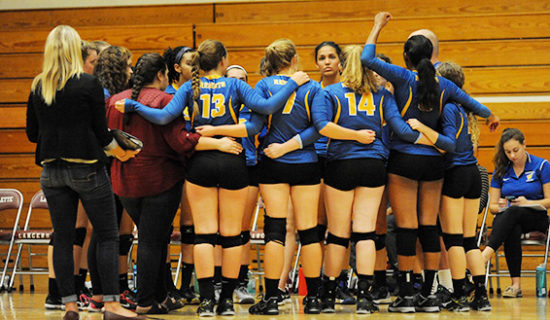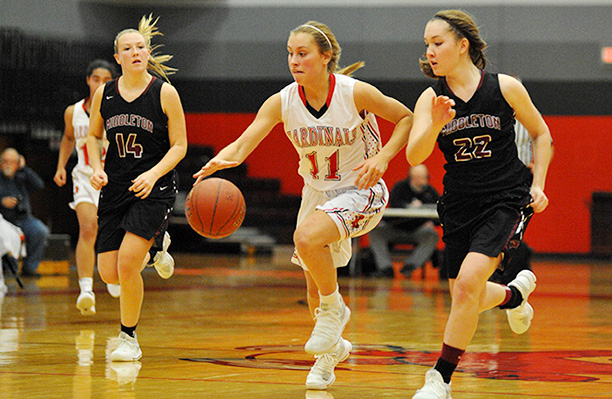Techniques to get your athletes talking (Part 2)
* This is the second of a two-part feature on athlete communication. Part one can be found here.
In part one of our feature on athlete communication, we looked at some of the reasons athletes fail to talk during games along with the first five of our 12 remedies to help turn things around.
 Picking up where we left off, here are seven more ideas to get players talking to their teammates during competition, improving your chances of victory.
Picking up where we left off, here are seven more ideas to get players talking to their teammates during competition, improving your chances of victory.
6. The six Rs of vocal leaders. These are perfect for those athletes who know they need to be more vocal but aren’t exactly sure what to say. These six simple suggestions, all beginning with the letter ‘R,’ provide athletes with a checklist of easy yet effective things that they can do and say throughout practices and competition to be more vocal.
- Remind. Vocal leaders continually remind their teammates about what is important — the common goal, the game plan and their roles. They remind people of the specific responsibilities that need to be done to achieve the team’s goal. Reminding includes simple phrases like, “We’ve got two outs, let’s get the last out at first base,” or “Be sure to block out the shooter on this free throw.”
- Reinforce. Vocal leaders also spend a lot of time reinforcing the positive strides made by the team. They compliment people often as a way to build their confidence and fuel a positive momentum and environment on the team. “I see you! That’s great effort in pushing through that difficult set.”
- Re-energize. There will be many times during practices and competition when vocal leaders need to pick up the team’s energy level and enthusiasm. They provide a spark of inspiration and help turn a passive team into a passionate team. “Hey let’s pick it up. We’ve got a chance to have a special season. Now’s the time to earn it.”
- Reassure. Because there are so many obstacles, setbacks and adversities involved in every season, vocal leaders need to reassure their teammates when they’re feeling nervous, scared, frustrated, helpless and hopeless. They preserve a sense of hope and optimism.
“We’re okay,” they might say. “We’ve got a lot of time to get back into this game. Take it one step at a time and we’ll be okay.” - Refocus. Vocal leaders spend a lot of time helping teammates refocus their negative thoughts on to something more positive and productive. They effectively shift teammates’ minds from the distractions and problems to workable solutions. “Yes, the officiating is horrendous but we can’t control it. Focus on our game plan and let’s make the adjustment.”
- Reprimand. Last but not least, vocal leaders must have the ability to constructively confront and reprimand their teammates when necessary. They must hold them accountable to live up to and maintain the team’s rules and standards. “I know you’re tired but giving up on that last sprint is not what we’re all about. We need you to push through this next one.”
7. The two-minute Drill. A great way to help your athletes practice being more vocal and refocus the team is to encourage them to run the Two-Minute Drill, originated by sport psychology guru Ken Ravizza.
When practices and workouts are getting sloppy, encourage your leaders to quickly call the team together. Have them get the team refocused by learning from the recent mistakes and putting their full focus on having a solid practice for the next two-minute span.
Breaking down the practice into a short, two-minute segments helps them let go of the past and focus on the moment. The Two-Minute Drill, initiated by your athletes, is usually enough to clear the cobwebs, right the ship, and have your team practicing at the high level of intensity and focus you need and expect.
Not only will the Two-Minute Drill greatly enhance the quality and consistency of your practices, it also teaches your team to quickly self-correct, rather than you having to continually go off on them as a coach or make them run for their lack of focus and leadership.
8. Echo the call. In the heat of battle, it’s often hard for your athletes to communicate, concentrate and hear your plays, strategies and adjustments. A simple yet effective rule to get them to be more vocal is to have your athletes echo the calls that are given.
By having each athlete vocally repeat the offense or defense you are in or the play you are running, you help ensure that everyone is on the same page and clear up any potential confusion. Get your athletes to echo the calls to each other in the practice setting and it will become a habit for them in pressure-packed game situations.
9. Coaching behind the scenes. We encourage coaches and captains to meet weekly to check in, discuss the state of the team and prepare for the upcoming week. During these meetings, your leaders will likely come up with some messages and insights that would be highly beneficial for the rest of the team to hear. Rather than you sharing their observations with the team as a coach, encourage your leaders to bring them up themselves with the team before or after a practice. Or if the situation is more serious, allow them to call and lead a team meeting.
Provided they are ready for it, encouraging your athletes to help you co-lead the team has many advantages, like empowering them and enhancing their responsibility and commitment. It also provides your team with another voice to share and reinforce messages that are good for the team.
Unfortunately, some athletes get tired of hearing their coach’s voice telling them to do the same things over and over again. You can vary the voice and message subtly by empowering your athletes to speak up and deliver it.
10. Work on tone of voice. Another important and more advanced thing to keep in mind is the tone of voice that your athletes use when they communicate. Once you start to get them to speak up, it’s also good to provide them with individual and private as well as 360-degree feedback on the tone they are using. Some athletes may say the right things, but their panicked, disgusted or condescending tone of voice overshadows their message.
You obviously want your athletes to communicate in a commanding yet calm and confident tone. Give your athletes feedback and coaching on when and how to say things. They need to choose their communication wisely as they find their voice.
11. Build confidence. As mentioned, many athletes are reluctant to speak up because they do not feel they have the confidence or respect of the team or coaches. Invest the time to talk with them behind the scenes to show and tell them you support them as a leader. You must convince them that their voice is needed and valued by the coaching staff, and hopefully the rest of the team.
Having your clear support and endorsement of them as leader, as well as that of their team, can instill them with the confidence necessary to be more vocal. Many athletes often stop leading vocally when they aren’t performing well. You’ll need to remind them that they still need to lead, even when they don’t have their ‘A’ game.
12. Praise the desired behavior. Finally, invest the time to praise your athletes when they are vocal. Take time to mention their contribution to the team after games and with the media if you are fortunate to be covered by them. Also, take the time in your individual meetings to thank them for being a vocal presence for your team. These simple gestures communicate to them how much they are appreciated.
Remember that finding one’s voice is a process that takes time. Getting your athletes to be more vocal is an ongoing process but one that is worth the effort. Not only will it help your team in the short term, but ultimately, you will help your athletes develop critical leadership and life skills in the long term.
For more info on helping your team win championships, visit www.JanssenSportsLeadership.com





